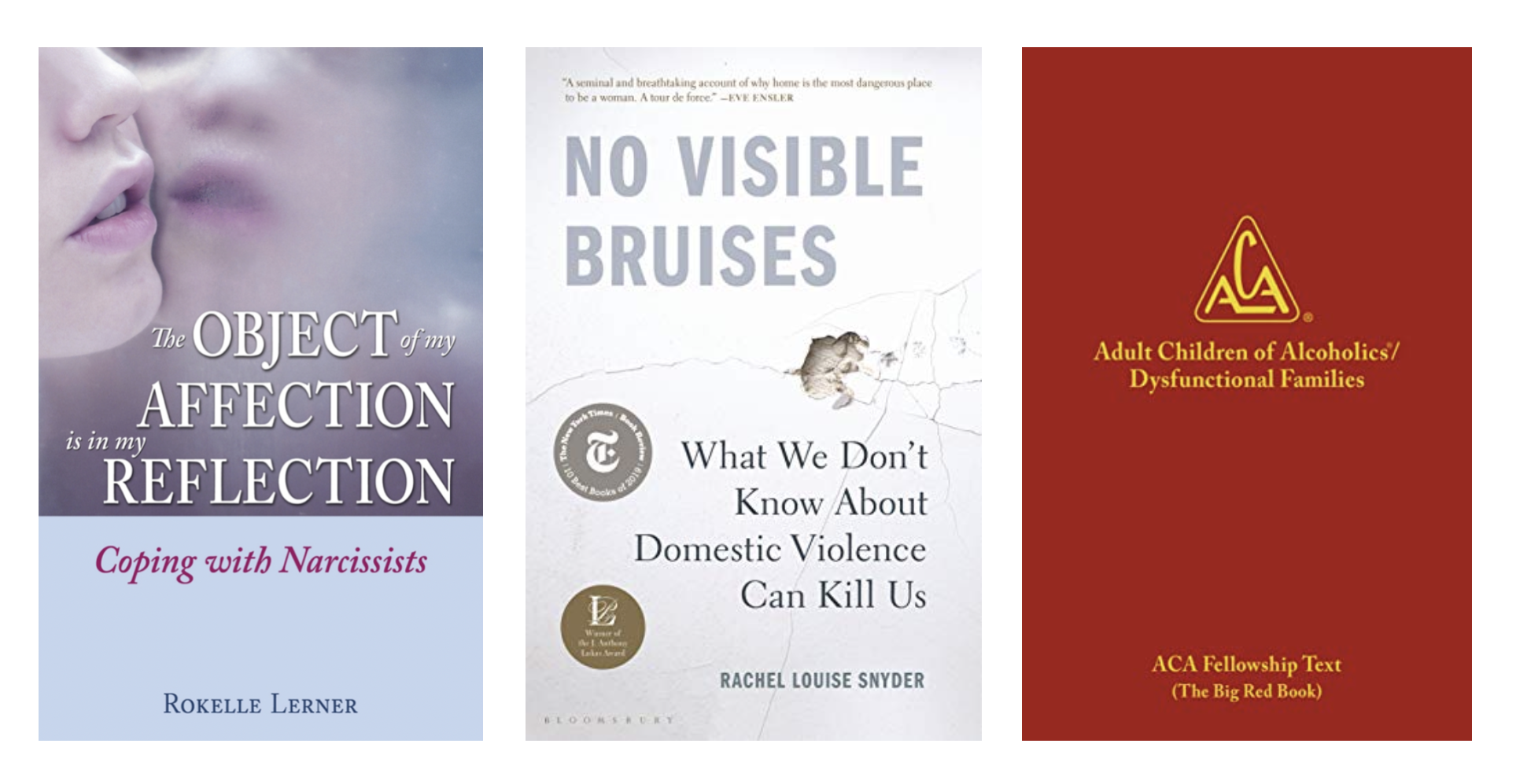
BOOK RECOMMENDATIONS – PART TWO: Toxic Environments
December 5, 2022
It’s time for round two! I’m unabashedly using this little blog series to continuing sharing the (personally) life-saving reads from my journey towards health, safety, and more courageous living after my past experiences with childhood trauma and abuse. I will read just about anything under the sun and am looking forward to featuring all sorts of genres and topics, but I’m going to follow up my first post staying in the same vein: when I was in my most toxic environment, these three books helped me gain perspective on how serious my situation was and ultimately urged me to get out and/or get help. (In particular, these books also hit three types of abuse/toxicity that were present in my story beyond sexual abuse.) And in case this is where you are, I’m going to share these books next—since time might very much be of the essence.
1. The Object of My Affection Is In My Reflection: Coping with Narcissists by Rokelle Lerner
How to convey how truly earth-shattering this book was for me? I read it when I was still living with my abuser, deep in the belly of the beast. My now-husband Sean secretly sent this to me when we were not allowed to communicate, so I kept it stored between my mattress and boxspring whenever I wasn’t reading. The worst patterns it outlined were undeniably present in my day to day reality; I would finish a page then immediately see the alarming dynamics playing out before my eyes thanks to a new and chilling insight. I both fully understood this book was articulating something very wrong and central to my life, while also feeling strong internal resistance against connecting this new vocabulary to my escalating lived experience.
While I’m not a trained or accredited expert and I don’t advocate that anyone force themselves to accept or apply anything that isn’t right for them, I currently think this is still the best book with the most helpful information I’ve read on this topic so far. It covers questions and concerns such as: What is narcissism? How/why do we think it develops? What are its longterm effects?…and more.
If I had to guess, I think reading this book when I did was the main catalyst to me realizing how dire a place I was in and that I needed to “go the mental health emergency room” because I had been formed by/exposed to the psychological and emotional equivalent of nuclear radiation or something like a cancer diagnosis for my entire life so far, and that if I didn’t take drastic, serious steps, I would likely forever suffer serious consequences.
2. No Visible Bruises: What We Don’t Know About Domestic Violence Can Kill Us by Rachel Louise Snyder
This might be one of the most sobering, important, and potentially life-saving books I’ve ever read. Similarly to the book above, I found it hard to accept its obvious truths. I realized I’d experienced escalating domestic violence and yet felt disbelief that this was my reality. It took me getting hit in the face by my father and then subsequently hiding from the cops who could have rescued me for me to hit my rock bottom in this area.
There are three sections in this book; the first focuses on the stories and experiences of the victims of domestic violence, the second part focuses on the perpetrators, and the third focuses on the helpers, advocates, and law enforcement’s efforts. Reading this book was also healing for me in better understanding (mine and) my mother’s choices in the often misunderstood fuller context of the patterns of DV in general.
3. Adult Children of Alcoholics/Dysfunctional Families by Woititz EdD, Dr. Janet G.
I read this book much later, after the first few years of my therapy journey. Honestly, I didn’t think it applied to me since there was no alcohol consumed in my home; my abuser didn’t drink. But I felt so very seen reading this book. To a great degree, disfunction is disfunction, and I found an incredible amount of helpful information here. After reading, I attended some local ACA meetings, again, curiously feeling like I wouldn’t belong. But, of course, I totally did.
Reading this book also helped me transition to making the effort to understand and hold space for all the other complicated and harmful things I had experienced throughout my upbringing besides my CSA and DM. This book also further developed my sense that we are all more similar than we are different, whether our abusers drank or not.
OKAY. I promise to pivot to a brighter batch next time! It doesn’t feel as if “happy reading” is appropriate to say here—I shall go with “hopeful reading!” instead. And this hope is that if you feel you should read these books, you will take what you need and make something beautiful from it all.
With love and gratitude,
Jessica
